Best Acoustic Guitar Strings In the World 2024
The results are in. We’ve listed the best acoustic guitar strings in each category and noteworthy information that will help you choose. Here, we cover acoustic guitar string names you’re probably familiar with. Some have remained a go-to, while others have improved their formulations.
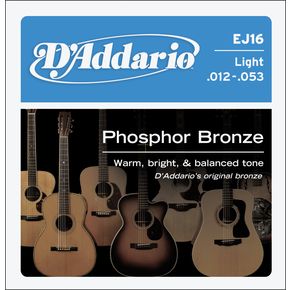
D’Addario EJ16 Phosphor Bronze
This popular non-coated Phosphorous Bronze set has a durable high-carbon steel core, and a warm tonality.
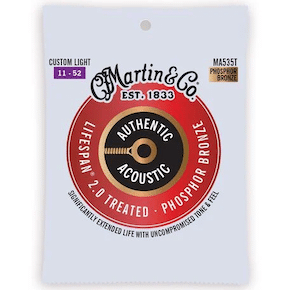
Martin SP Lifespan 2.0
Long-lasting acoustic strings with patented anti-corrosion treatment and diverse gauges for versatile playing styles.
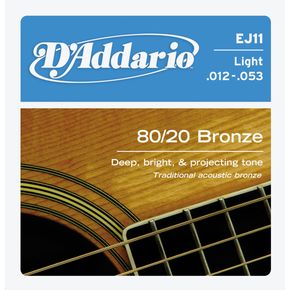
D’Addario EJ11 80/20 Bronze
Affordable 80/20 Bronze set. The crisp tone is ideal for recordings. Works well with many different styles.
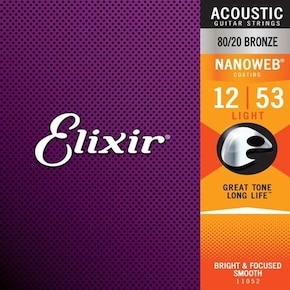
Elixir 80/20 Bronze Nanoweb
Elixir's top-selling Nanoweb-coated strings that extends string life while preserving your natural tone.
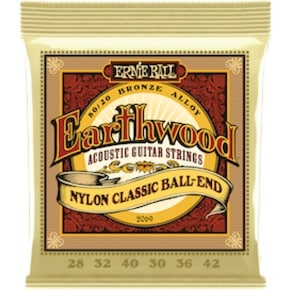
Ernie Ball Earthwood Nylon
D'Addario's best-selling nylon set, thanks to its consistent quality, mellow tone, and responsiveness.
We’re reader-supported. When you click product links on our site, we may earn an affiliate commission at no extra cost to you.
In your guitar journey, you are free to choose whatever the best acoustic strings listed here are.
However, it is recommended that you consider strings for acoustic guitars that are close to, if not the same as, the original ones installed on your guitar.
There is still a difference between acoustic and classical guitars.
We’ve also dedicated a “Things to Consider” section to help you decide which strings are best for your setup.
Now, let’s begin!
Best Acoustic Guitar Strings Phosphor Bronze Wound
This type of wound is the current favorite of many guitar players because of its balanced and rounded tone. Phosphor bronze strings offer great versatility and cover any genre. This special alloy also lasts longer than the traditional 80/20 Bronze guitar strings.
- Table of Contents
D’Addario EJ16 Phosphor Bronze
Best Phosphor Bronze Acoustic Guitar String Set

D’Addario EJ16 Phosphor Bronze
Guitarsite Expert Opinion
It’s a familiar favorite with a high-carbon steel core for durability. It produces warm, well-rounded tones for jazz, country, and pop. Corrosion-resistant packaging ensures freshness. Ideal for versatile guitarists, it is available in various gauges.
We’re reader-supported. When you click product links on our site, we may earn an affiliate commission at no extra cost to you.
The EJ16 is a familiar favorite non-coated Phosphor Bronze set. The hexagonal steel core is high carbon and durable for strumming and fingerstyle playing.
This set of D’Addario acoustic strings is designed to produce relatively warm and well-rounded acoustic guitar tones. Whether you’re playing jazz, country, or pop, it will accommodate various musical genres. It also boasts corrosion-resistant packaging, ensuring that you get your strings factory-fresh.
The EJ16 would benefit guitarists who want affordable acoustic strings that cover different styles. It’s available in different gauges and packs.
Pros:
- Can accommodate different genres
- Has a well-rounded tone
- Resilient strings
Cons:
- Easily discolored
Specifications: | |
|---|---|
Type: Steel String Acoustic Guitar | Core: Hexagonal High-carbon Steel |
Gauges: Extra light to heavy | Winding: Round wound |
Martin SP Lifespan 2.0
Best Acoustic Guitar String Set – Overall

Martin SP Lifespan 2.0
Guitarsite Expert Opinion
Durable strings with patented anti-corrosion treatment, diverse gauges for folk, country, and blues, and high-precision manufacturing ensure quality. Suitable for all skill levels, they guarantee longevity without compromising tone.”
We’re reader-supported. When you click product links on our site, we may earn an affiliate commission at no extra cost to you.
If it’s not already apparent from its name, these acoustic guitar strings preserve its longevity while preserving a good tone. The Martin SP Lifespan 2.0 promises that its bronze finish has a patented anti-corrosion treatment that protects the core.
It’s made possible by their high-precision manufacturing process, which ensures the utmost quality of their strings.
These Martin acoustic guitar strings also feature a variety of thinner to thicker strings so you can use them in folk, country, and blues. Light gauge strings are advisable for beginners, while heavier strings are for a bigger, more resonant tonal quality.
It’s great for anyone at any skill level and playing style. Plus, you’re assured that you won’t change strings for a long time.
Pros:
- Lasts a long time
- Great for all kinds of guitar players
Cons:
- Leans a bit on the stiffer side for some people
Specifications: | |
|---|---|
Type: Steel String Acoustic Guitar | Core: Steel |
Gauges: Light, medium | Winding: Round wound |
80/20 Bronze (Brass) Wound Sets
This is the traditional and affordable acoustic guitar string wound that many players prefer. It initially delivers a brighter tone that professional players prefer. This brightness gradually levels out as the string ages with use.
D’Addario EJ11 80/20 Bronze
Best 80/20 Bronze Acoustic Guitar String Set
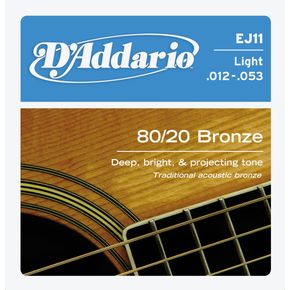
D’Addario EJ11 80/20 Bronze
Guitarsite Expert Opinion
The popular 80/20 Bronze set has a crisp, projecting tone ideal for recordings and offers versatility for different preferences. It is perfect for traditionalists, vintage enthusiasts, and performers seeking standout acoustic tones.
We’re reader-supported. When you click product links on our site, we may earn an affiliate commission at no extra cost to you.
The EJ11 is an affordable 80/20 Bronze wound acoustic guitar string set that sells like pancakes. It was the original acoustic string alloy back in the 1930s, and this historical significance attracts traditionalists and vintage enthusiasts.
These D’Addario acoustic strings are the go-to choice in acoustic recordings due to their crisp, deep, and projecting tone. The sparkle on the high end can cut through the mix without overpowering the mids and the highs. The light gauge versions, however, are too bright for some. For acoustic guitar string gauges, choose the one that fits your preference.
It’s perfect for those who want their tones shining through night gigs and recordings.
Pros:
- Bright and bold tones
- Great sound in acoustic recordings
- Cuts through in live performances
Cons:
- Lighter gauges are a bit too bright
Specifications: | |
|---|---|
Type: Steel String Acoustic Guitar | Core: Hexagonal High Carbon Steel |
Gauges: Light, medium | Winding: Round wound |
Martin Guitar Original Acoustic (M140)
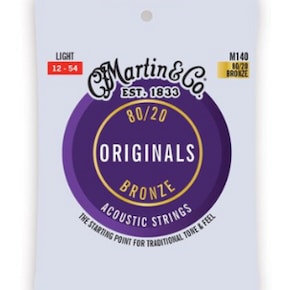
Martin Guitar Original Acoustic (M140)
Guitarsite Expert Opinion
Martin’s legendary string is renowned for deep bass and brilliant highs. It is durable for daily use and consistent in various styles. It is ideal for busy guitarists with daily rehearsals and frequent performances.
We’re reader-supported. When you click product links on our site, we may earn an affiliate commission at no extra cost to you.
These Martin strings were called the “string that started it all.” They’ve been around for 50 years and are still used for their deep bass tones and brilliant highs.
This string can withstand daily use for practice or long rehearsals. It is made of high-grade bronze and yields a consistent sound in different playing styles.
This means the brilliance and bass will be maintained throughout, whether strummed, fingerstyle, or flatpicking.
If you consider yourself a busy guitarist, rehearsing daily and playing 3-4 times a week, this will fit you like a glove.
Its heavy-duty composition proves that 50 years of runtime makes it tried and tested.
Pros:
- Heavy Duty
- Accommodates different play styles
- Tried and tested
Cons:
- No heavy gauge options
Specifications: | |
|---|---|
Type: Steel String Acoustic Guitar | Gauges: Extra Light, Custom Light, Light, Medium |
Core: Steel | Winding: Round wound |
Coated Acoustic Guitar Strings:
These acoustic guitar strings have a thin coating layer that protects them from the elements, lengthening their lifespan. This same coat, however, dampens the strings, allowing you to gain improved durability at the cost of losing some tone and resonance. Some swear that the difference is negligible and the benefits outweigh the additional cost.
Elixir 80/20 Bronze with Nanoweb
Best Coated Acoustic Guitar Strings

Elixir 80/20 Bronze with Nanoweb
Guitarsite Expert Opinion
Elixir’s top-selling 80/20 Bronze with Nanoweb: The enhanced formulation preserves traditional tone and durability. It is gentle to the touch and brilliantly full tone minus finger and fret squeak. It is ideal for acoustic guitarists seeking premium coated strings.
We’re reader-supported. When you click product links on our site, we may earn an affiliate commission at no extra cost to you.
The Elixir 80/20 Bronze with Nanoweb is among the best-seller lists for coated guitar strings. It’s a trifecta of quality: it works well, sounds good, and lasts a long time.
If you’re familiar with the polyweb version, these elixir strings for acoustic guitar have a more improved formulation.
It keeps the traditional tone and feel of the Bronze wound with space-age durability and has better ultra-thin NANOWEB tube coating. That brilliant and full tone, minus the finger and fret squeak, is a good way to put it.
Due to this, the strings feel gentle to the touch and don’t feel excessively abrasive.
This could potentially end your search in testing acoustic guitar strings with premium coating.
Pros:
- Minimal finger squeak
- Organic sounding coated set
- Nanoweb preserves your strings for a long time
Cons:
- Pricer than traditional strings
Specifications: | |
|---|---|
Type: Steel String Acoustic Guitar | Gauges: Extra Light to Heavy |
Core: Steel | Winding: Round wound with Nanoweb coating |
D’Addario XT Phosphor Bronze Coated Strings
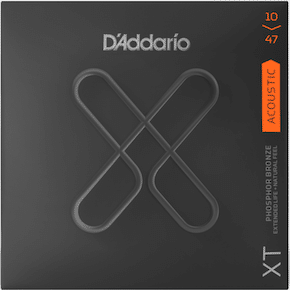
D’Addario XT Phosphor Bronze Coated Strings
Guitarsite Expert Opinion
EXP17 rebranded as XT: Phosphor bronze with ultra-fine XT coating, NY steel core, Fusion Twist technology for stability. Ensures warm tone, longevity, and pitch stability for extended playing.
We’re reader-supported. When you click product links on our site, we may earn an affiliate commission at no extra cost to you.
We featured the EXP17 in our past reviews, and they’ve rebranded it as XT. An ultra-fine layer of XT coating is attached to the phosphor bronze wrap wire before being wound onto the hex-shaped inner core wire. The coating creates a long-term barrier against corrosion and wear, keeping the strings sounding fresh.
Through its NY steel core, it aims to preserve longevity and prevent tone and pitch loss over time. They’ve also included their new Fusion Twist technology, stabilizing the strings for optimal playing.
Phosphor bronze is known for its warmer tone than 80/20 bronze. With this, you’re assured that it will stay warm and in tune for longer.
Pros:
- Prevents corrosion and wear
- Good longevity
- Fusion Twist technology for stable tone
Cons:
- A bit expensive
Specifications: | |
|---|---|
Type: Steel String Acoustic Guitar | Gauges: Extra Light to Medium |
Core: Hexagonal High-carbon NY Steel | Winding: Round wound |
Coating: XT Coat | |
Nylon Classical Guitar Strings:
Acoustic guitar strings generally produce a brighter tone. However, classical guitars have traditional, low-tension Nylon strings that sound dynamic and mellow. The lower register strings also have nylon at the core and are wound with metal, usually silver-plated copper.
Ernie Ball Earthwood Folk/Classical Guitar Strings
Best Nylon Strings

Ernie Ball Earthwood Folk/Classical Guitar Strings
Guitarsite Expert Opinion
The nylon core, 80/20 bronze wrap, evokes an organic design. It produces mellow tones reminiscent of folk/classical yet bright enough for percussive play without buzzing. Ideal for nostalgic, singer/songwriter sounds.”
We’re reader-supported. When you click product links on our site, we may earn an affiliate commission at no extra cost to you.
The Earthwood Folk/Classical has been constructed with a multifilament nylon core. The outer layer of the lower strings is wrapped with an 80/20 bronze and a ball end for quick and easy installation.
The logo itself already evokes that organic, old-school-looking design. Indeed, playing with the guitar strings produces a mellow tone reminiscent of folk, indie, and classical genres. However, it’s also bright enough to handle percussive playing without buzzing.
If your playing style leans toward nostalgic but evocative sounds, the Earthwood Folk/Classical Strings will be a treat.
Pros:
- Balanced tone
- Can be mellow or percussive
- Great for playing styles with varying dynamics
Cons:
- May snap in excessive tensions
Specifications: | |
|---|---|
Type: Nylon String / Classical Guitar | Gauges: Extra Light to Medium |
Winding: Silver-plated copper wrap | Core: Nylon |
D’Addario Pro-Arte Classical
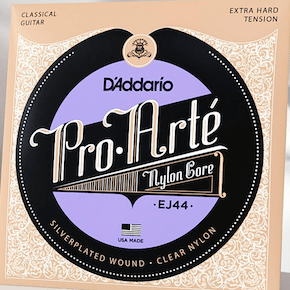
D’Addario Pro-Arte Classical
Guitarsite Expert Opinion
Best-selling nylon set with laser-measured precision ensures consistent quality and precise intonation. Mellow tone, unmatched responsiveness, clear across dynamic range. Ideal for classical performances, available in various tensions.
We’re reader-supported. When you click product links on our site, we may earn an affiliate commission at no extra cost to you.
Up to this day, this is D’Addario’s best-selling nylon string set. Each string is scientifically crafted with a laser machine that measures its diameter and tension to ensure consistent quality and precise intonation in every string.
Its multi-filament nylon core and silver-plated copper wound combine to produce a mellow, warm tone. The strings’ responsiveness is unmatched.
Fingerstyle playing with pianissimo to forte passages is very distinct. It also maintains those clear tones despite the wide dynamic range. As always, it comes in a variety of tensions and gauges.
The Pro-Arte Classical is the best acoustic string if you want that sought-after, standard classical tone for your recital and concert performances.
Pros:
- Standard classical tone
- Consistent quality and feel
- Works with dynamic playing styles
Cons:
- Minor string noise issue
Specifications: | |
|---|---|
Type: Nylon String / Classical Guitar | Gauges:Light to Extra Hard |
Winding: Silver-plated copper wrap | Core: Nylon |
Things to Consider in Choosing the Best Multi-Effects Pedal
Guitar Type
Different acoustic guitars have specific string requirements. Acoustic steel guitars are compatible with any steel string. Conversely, using nylon strings is best if your playing style leans more toward classical.
Nylon and steel strings can’t be interchanged with any acoustic guitar. Using steel strings on a nylon acoustic guitar and nylon on an acoustic steel could affect your guitar’s action.
String Thickness
String thickness, or string gauge, refers to how big or small the string’s diameter is. Smaller or lighter gauge strings are easy on the fingers and have a more relaxed tension. Sound wise, light strings tend to have a brighter tone but can sound tinny in context with other instruments.
Due to their surface area, heavier strings output better volume and have a warmer tone. The tradeoff is that they’re harder to fret.
This same principle applies to electric guitar strings and other stringed instruments.
Skill Level and Playing Style
You will notice that most strings featured are in light gauges because lighter strings have better compatibility with different guitars, and are easier to play.
Beginners are usually advised to get a light to medium gauge for playability. However, you should still get thicker gauge strings if you want bigger tones or if you play aggressively. This is especially true when choosing electric strings.
Though not a strict requirement, specific genres do have a preference when it comes to what strings you use. If you play acoustic electric guitars in a rock band, you’ll want thicker strings to help your guitar sound better in a mix.
Bronze acoustic guitar strings tend to be brighter. Nylon strings are the opposite–it yields a warm and mellow tone.
Final Thoughts
These are the best acoustic guitar strings that can serve as your starting point.
All things considered, feel free to experiment with different types of acoustic guitar strings, and you’ll find what suits you best. Keep an eye out for good acoustic guitar strings deals like bundle packs.
Whether you’re playing an acoustic steel string guitar or a nylon string guitar, you’ll find a good acoustic string set right here.
Which acoustic guitar strings are your favorites? Let us know in the comments below!
Alexander Briones
Lead Author
Allen Articulo
Contributor: Research and Supplemental Writing


1 thought on “Best Acoustic Guitar Strings”
I have a Mountain acoustic. It is a Martin D28 copy from Japan. The quality is equal to any original Martin D28. I have had this guitar since 1975 but haven’t played for awhile. I used D’Angelico light acoustic string which produced awesome tones. Would like to know who’s strings would be equal to these gems because apparently D’Angelico no longer makes acoustic strings. Have tried different brands but nothing seems close. Please Help.